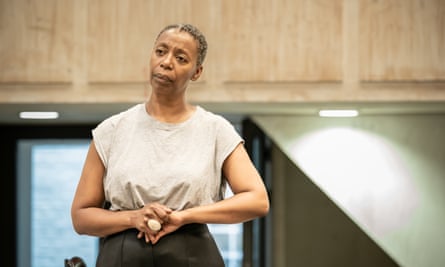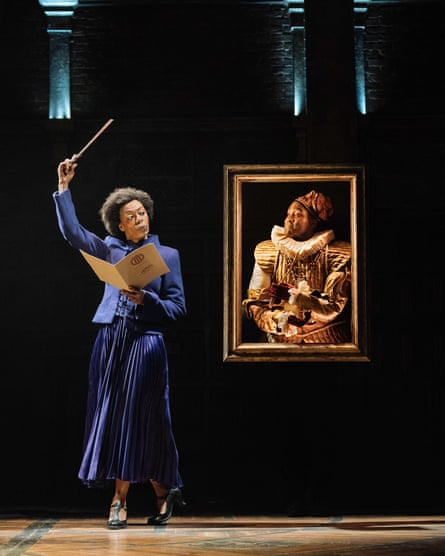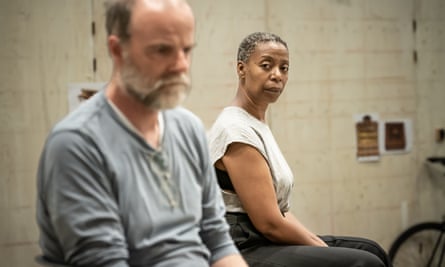Noma Dumezweni is enjoying growing older – hardly surprising when you consider how much success the 52-year-old actor has enjoyed in recent years. After two decades of alternating between well-received theatre roles and ephemeral guest spots on Casualty and Holby City (“I’d play a nurse here, a receptionist there”), she hit the big time in 2016 when cast as the adult Hermione Grainger in Harry Potter and the Cursed Child, the stage play set 19 years after the events of the final novel in the series.
In terms of her career, the Potter effect could be witnessed overnight: “I’ve always done two or three plays a year,” says Dumezweni. “And then you go: ‘I’ve got this TV work, I’ve got that TV work – this is a nice new world.’” And it’s true that things are ticking along nicely. A guest spot in BBC Three’s lockdown hit Normal People was followed by a main role in The Undoing, the Hugh Grant and Nicole Kidman-starring psychological thriller that pipped Succession to the title of HBO’s most watched show of 2020.
“I was like: ‘Shut the fuck up!’” she laughs. “Nicole Kidman and Hugh Grant? And Donald motherfucking Sutherland! I’ve watched those people for ever, and it’s just one of those moments where I can’t believe I’m in the same room as them.” Was it difficult acting alongside such massive names? “No. They’re absolutely the stars that they are, but they’re generous people. And I think that’s what surprised me more than anything. Hugh’s not an easy person to be with, but he’s a funny person to be with, and there’s a point where you relax and go: ‘Oh, we’re good. I’m not scared of you,’ because he’s not scary!”
Our conversation takes place on the eve of Dumezweni’s return to the London stage as Nora in A Doll’s House, Part 2 at the Donmar Warehouse. Written by the US playwright Lucas Hnath (The Christians), it picks up at the conclusion of Ibsen’s original, and sees the play’s disillusioned housewife return to her family after a 15-year absence.

Sitting cross-legged on a bench outside the theatre’s rehearsal rooms, smoking intermittently, Dumezweni intersperses her answers with jovial “mates” and “darlings” – more in keeping with south London, where she now lives, than Eswatini (formerly Swaziland), where she was born, or Suffolk, where she was raised, having arrived in England as a refugee aged seven. Dumezweni began acting at the New Wolsey theatre in Ipswich, where she took classes while her mum was at work. She enjoyed the workshops, but when she moved down to London, aged 18, it wasn’t with the specific goal of making it as an actor. Rather, she was “internally screaming: ‘There should be more in the world.’”
She never attended drama school, but got her start in theatre in Kay Adshead’s one-woman show about asylum seekers, The Bogus Woman, before securing small roles in Stephen Frears’s Dirty Pretty Things and a West End production of Antony and Cleopatra.
She still seems shocked to have been cast as Hermione. “I was just doing a workshop,” she says. “I thought it was going to be someone younger and most likely mixed race. That’s the judgment I had on the world.” When the call came through that they wanted her, Dumezweni felt strangely reluctant. “I had to go sit with it for two weeks, thinking: ‘Do you want to do this?’” she says, recoiling in mock horror. “All those dreams you have, and then it’s here, the door is open; do you walk through it?”

Theatre castings rarely spark headlines, but the decision to cast a Black actor as Hermione was highly controversial, with the scale of the outrage compelling JK Rowling to tweet that the colour of Hermione’s skin was never specified in the books. Dumezweni was exposed to some nasty comments, but she remembers consciously thinking: “I’m not going to involve myself, I have to get into rehearsals because this is huge. We’re going into a world that already has its optics from the films.”
Still, she couldn’t resist speaking out, describing the criticism as “unimaginative … it stems from ignorance”. Five years on, she is more reflective, wishing to dwell on the positive legacy of a Black Hermione rather than the hate she received. “So many people came to see the show. Girls and boys from China, from the Philippines, from Africa, saying: ‘Thank you. That’s the version I had in my head,’” she says. “It opened up the possibilities of what storytelling is.”
Dumezweni’s Hermione was rewarded with the Olivier award for best supporting actress, vindication for the decision to give her the role. She had won the equivalent award a decade earlier for her performance in a revival of A Raisin in the Sun, beating Benedict Cumberbatch, in the days before the category was divided by gender. “[After] that first Olivier, I expected to be doing some more work but it didn’t happen,” she says. “It was a great humbling. I felt despondent and angry that people were getting things that I should be getting, but I had no way of getting in the room. I had a sense of needing to be validated by my job, so if I’m not working then who am I? Thank God I’ve passed through that water.”
She credits her daughter, Qeiva, born in 2007, with lifting her out of that mindset. “Suddenly, it wasn’t about me any more. I love acting but there’s no money in theatre. So if I am away from the child, the jobs have to be interesting creatively,” she says. “It hasn’t been smooth and perfect. But that was a very clear moment of decision-making, because before that I’ve taken a couple of gigs for money, and they were not right whatsoever.”
When the pandemic hit, Dumezweni was in New York, in the middle of a three-year stay doing Harry Potter on Broadway and then filming The Undoing. “I know it sounds weird but I had a great time, in the sense that I was able to sit and take stock. It gave me a break to just stop, sit, eat, drink loads of wine, and get plump – your trousers don’t fit any more and it doesn’t matter!”

George Floyd was killed two months into the pandemic. Dumezweni describes the impact of his murder and the subsequent protests as “seismic for me internally. It was an extraordinary time to be with my daughter. I get pissed off when people say Black Lives Matter is a political movement. For me it’s: ‘See me as a human, don’t see my colour first.’ Because every time I walk into a room as an older Black woman, that already comes with judgment.”
Of course, Black Lives Matter resonated far beyond the relatively trivial concerns of acting, but Dumezweni says she is “fearless now, in terms of being a Black woman in that space. Before it really was a cultural conditioning – I speak about this a lot especially with Black and brown, female actors. And we went: ‘Oh my God, we did make sure people were comfortable first, so you’re not seen as aggressive, you’re not seen as challenging [authority].’ That’s why I love this play,” she says, likening her evolution to the experience of her character in A Doll’s House, Part 2. “Nora has to meet herself. She comes in with one agenda [and] has to grow in a different way. That’s what [BLM] did for me. I will always be respectful but now I’m not scared of saying no. Think about that.”
Is she still being exclusively offered nurse and receptionist roles on TV? “I feel as if I’ve proved my mettle, they’re more highfalutin now,” she says, citing her next role as a surgeon in Best Interests, the upcoming BBC drama from Jack Thorne, starring Sharon Horgan and Michael Sheen. “Early days I’d get to play the maid … All right, then I’m gonna be the best effing maid you’ve ever seen.”
Next year, Dumezweni will appear in Disney’s live-action remake of The Little Mermaid. Her role is as yet unconfirmed, but she is rumoured to be playing Ariel’s mother, Queen Athena – another character from a children’s franchise who has previously been white. “I can’t talk about what I’m doing,” she says. “But I promise you that it is fucking beautiful.
“I used to hate being called Auntie, but now I get it,” she says, fully embracing her role as a maternal figure to a new generation of Black British actors such as her Harry Potter co-star Cherrelle Skeete and Bond star Lashana Lynch. “I’m here to cheerlead you on because I know how shit it’s been,” she says. “Any time you get low, sit in it but don’t indulge in it. I wasted too much time worrying about what other people thought about me. Forward motion – that’s what I’m doing now.”
A Doll’s House, Part 2 is at the Donmar Warehouse, London, 10 June to 6 August.
